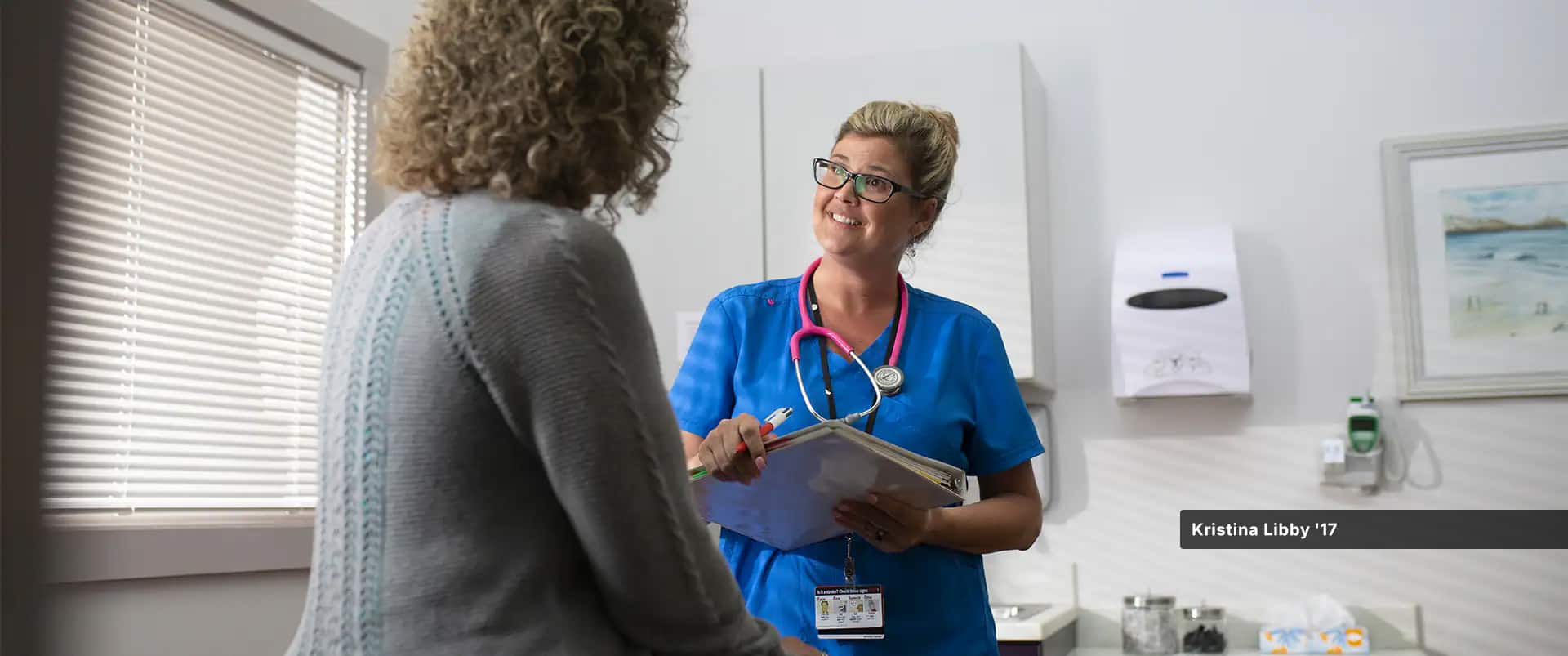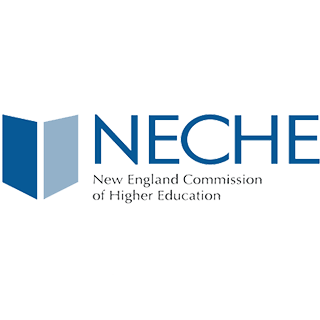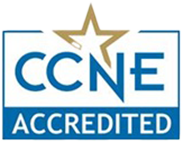What is Healthcare Administration?
Health | 10min Read

If you're a registered nurse ready to take on new challenges and roles in the nursing field, the Bachelor of Science in Nursing (RN to BSN) program at Southern New Hampshire University (SNHU) could be a great option for you. Designed with busy nurses in mind, the program offers an affordable and flexible pathway for earning your BSN online.
Maybe you're a nurse looking to advance your career in leadership or clinical practice. Or maybe you enjoy working at the bedside, but want to better support your patients. In the RN to BSN online program at SNHU, you can gain the skills needed to implement evidence-based best practices and positively impact healthcare.
Plus, you'll get 45 credits for your unencumbered RN license and can transfer up to 45 more credits. By transferring in the maximum 90 credits, your BSN degree may already be 75% complete when you enroll at SNHU.
Throughout your degree courses, you'll develop critical nursing skills and competencies, including evidence-based care, health promotion, disease prevention and leveraging technology to enhance your clinical and professional development.
All undergraduate students are required to take general education courses, which are part of SNHU's newly redesigned program, The Commons. The goal of The Commons' curriculum is to empower you with some of the most in-demand skills, so you can succeed not only in your academic career, but in your personal and professional life too.
Looking to gain professional healthcare experience before you graduate? Specially designed for learners in healthcare and nursing, HEaRT (Higher Education and Real World Training) is a powerful experiential learning opportunity at SNHU. These online, asynchronous, voluntary experiences help connect students with employers to help solve real-world business problems – so you can be ready to make an impact in your field.
If you're looking to earn your MSN – and want to save time and money along the way – the accelerated RN to MSN online pathway option could be the right fit for you.
This pathway option allows you to complete graduate-level courses as an undergrad, reducing 4 of the MSN tracks (Population Healthcare, Family Nurse Practitioner, Healthcare Quality & Safety and Nurse Executive Leadership) by 6 credits and 1 of the MSN tracks (Nursing Education) by 9 credits.
The graduate-level courses required for this pathway option are:
It's important to note that in order to move into the MSN program, you must apply and be accepted after graduating from SNHU's BSN program.
RN to BSN students who transition into the accelerated RN to MSN online pathway option can choose from 5 specialty tracks designed to fit your career goals:
Take your nursing expertise and passion for teaching to an academic or clinical setting. Nursing education is a high-demand field with a promising future, as healthcare itself is dynamic and ever-evolving. As a graduate of this program, you'll meet the educational requirements you need to sit for the Certified Nurse Educator (CNE) exam offered by the National League for Nursing.
This MSN track requires 135 clinical practicum hours under the guidance of preceptors in your final course.
Promote practices that keep communities safe. An MSN in Population Healthcare can help you identify ways to connect practice to policy in pursuit of local change. You'll learn how partnerships among different sectors of the community – such as public health, industry, academia, health care, local government entities and beyond – can help achieve positive health outcomes.
This MSN track requires 135 clinical practicum hours under the guidance of preceptors in your final course.
MSN - Family Nurse Practitioner
Position yourself for success in 1 of most in-demand nursing roles. As a family nurse practioner, you'll have the skills needed to step into a role as a primary care provider. You'll also be able to provide care in environments as diverse as family medicine, private practice, community health clinics and more.
This MSN track requires a total of a minimum of 750 practicum across five practicum courses.
MSN - Healthcare Quality & Safety
Become an advocate for change and gain the skills you need to implement a culture of safety. In this program, you'll design, implement and evaluate healthcare quality improvement initiatives guided by critical thinking, data-driven decision making and evidence-based practices.
This MSN track requires 135 clinical practicum hours under the guidance of preceptors in your final course.
MSN - Nurse Executive Leadership
Set the vision for the delivery of safe, timely, efficient, equitable and patient-centered care. As a nurse leader in executive practice, you'll build leadership, strategic planning, human resources and finance skills. Working within a collaborative and interprofessional environment, you'll influence and improve both the patient experience of care and the health of populations.
This MSN track requires 135 clinical practicum hours under the guidance of preceptors in your final course.

At SNHU, we’re committed to your success – even beyond graduation. That’s why we offer accredited continuing education for nurses and healthcare professionals. From 1-hour webinars to multi-day conferences and more, these opportunities are built to help you continue to meet the needs of communities across the globe.
Visit our SNHU continuing education page to learn more.
Southern New Hampshire University is accredited as a provider of nursing continuing professional development by the American Nurses Credentialing Center's (ANCC) Commission on Accreditation.
Students enrolled in the BSN program are responsible for ensuring they have the minimum system hardware, software and equipment. In addition to the SNHU technology requirements, BSN students should have the following:
Minimum Specifications:
Additional Information:
Our no-commitment application can help you decide if SNHU is the right college for you and your career goals. Apply up until 2 days before the term starts!
Upcoming term starts: October 27, 2025 | January 5, 2026
Attending college online at SNHU can be a life-changing experience. In fact, 91.6% of online students would recommend SNHU according to a 2024 survey with 8,000+ respondents.
When we say "built for nurses, by nurses," we mean it. Courses throughout the BSN program are taught by instructors with years of firsthand nursing experience.
 Dr. Kristi Dalby, DNP, RN, CNE
Dr. Kristi Dalby, DNP, RN, CNE
Before her 15+ years in higher education, Dr. Kristi Dalby was a nurse in acute care settings. She brings more than a decade of experience in the intensive care unit, stepdown unit and emergency department to her work at SNHU. Dalby has been recognized with multiple nursing and educator awards, including the D2L Excellence Award from Higher Education and Real-World Training (HEaRT) and the Advisors Recognizing Excellence Award from SNHU. Dalby is also a Certified Nurse Educator.
Position
Undergraduate Nursing Program Director
Joined SNHU
2015
Education
Read more about Dr. Kristi Dalby and other online faculty at SNHU.
Hear what some of our SNHU instructors have to say about our online BSN program:
 "Faculty at SNHU recognize the unique life and professional experiences that students bring into the BSN program. We view students as collegial partners and value their professional expertise in the classroom as we share knowledge and learn with one another. We recognize the importance of individualized student support to encourage students’ personal and professional goal achievement as they explore professional development opportunities within their career."
"Faculty at SNHU recognize the unique life and professional experiences that students bring into the BSN program. We view students as collegial partners and value their professional expertise in the classroom as we share knowledge and learn with one another. We recognize the importance of individualized student support to encourage students’ personal and professional goal achievement as they explore professional development opportunities within their career."
Elizabeth Christman, DNP, RN, CNE, clinical faculty at SNHU
 "Education from SNHU provides a wealth of opportunities for students to grow and expand their careers while juggling the demands of work, home and school. Having this education enables not only the student to grow professionally but can have a positive impact on their family and community."
"Education from SNHU provides a wealth of opportunities for students to grow and expand their careers while juggling the demands of work, home and school. Having this education enables not only the student to grow professionally but can have a positive impact on their family and community."
You’ll take your courses within SNHU’s Brightspace platform. This is where you’ll find your:

At Southern New Hampshire University, you'll have access to a powerful network of more than 400,000 students, alumni and staff that can help support you long after graduation. Our instructors offer relevant, real-world expertise to help you understand and navigate the field. Plus, with our growing, nationwide alumni network, you'll have the potential to tap into a number of internship and career opportunities.
Recently, SNHU has been nationally recognized for leading the way toward more innovative, affordable and achievable education:
Founded in 1932, Southern New Hampshire University is a private, nonprofit institution with over 250,000 graduates across the country. SNHU is accredited by the regional accreditor New England Commission of Higher Education (NECHE), which advocates for institutional improvement and public assurance of quality.
No application fee. No test scores. And no college essay. Just a simple form with basic information. It’s another way SNHU helps you reach your goals sooner.
It's easy, fast and free.
If you are considering an MSN program at SNHU, please check MSN admissions criteria including GPA requirements.
If you are an RN to BSN student interested in the accelerated RN to MSN online pathway option, contact an admission counselor or your academic advisor for more information.
Graduates of an ASN program from a New Hampshire community college should contact an admission counselor at Southern New Hampshire University to learn more about our tuition benefit and admission requirements.
NOTE: SNHU nursing programs are not authorized in the state of Washington or US territories and we are not accepting students residing in Washington state or US territories into Nursing programs at this time. Currently enrolled students who move into the state of Washington or a US territory will not be able to continue in nursing courses until they move out of the state of Washington or the US territory. Prospective students are encouraged to contact Admission, and current students should contact their Advisor, for more information.
Students enrolled in SNHU nursing programs must comply with requirements of the healthcare organizations where their Clinical Practice Experiences will be completed. If the healthcare organization requires an affiliation agreement prior to conducting Clinical Practice Experiences, additional requirements may include (but are not limited to) criminal background checks and verification of licensure, drug testing, immunization records, health insurance, and medical malpractice insurance. Students are responsible for any costs incurred as a result of meeting these additional requirements.
Whether you're applying for an undergraduate or graduate degree, you’ll fill out a form to verify your previous education experience. As part of our admissions process, we'll help you request transcripts from your previous school(s) to see if you can transfer any credits into your SNHU program! (Also for free!)
After reviewing your official evaluation, you can decide if SNHU is right for you! If you choose to enroll, just pick your start date and get ready for classes to begin.
Talk to an admission counselor: 888.327.SNHU | enroll@snhu.edu
SNHU is accredited by the regional accreditor the New England Commission of Higher Education (NECHE). The university also carries specialized accreditations for some programs.
The baccalaureate degree program in nursing and the master’s degree program in nursing at Southern New Hampshire University are accredited by the Commission on Collegiate Nursing Education, 655 K Street NW, Suite 750, Washington, DC 20001, 202.887.6791.


As a nonprofit university, SNHU offers some of the lowest online tuition rates in the country. And when you work with our Financial Services team, we'll explore ways to help you save even more on your education – and customize a payment plan that works for you.
*before previously earned credits are applied
Tuition rates are subject to change and are reviewed annually.
**Note: Students receiving this rate are not eligible for additional discounts.
Additional costs: Course materials vary by course.
If 45 of your prior learning credits ($342/credit) are accepted toward your bachelor’s degree.
Your remaining tuition cost: $25,650
If 60 of your prior learning credits ($342/credit) are accepted toward your bachelor’s degree.
Your remaining tuition cost: $20,520
If 75 of your prior learning credits ($342/credit) are accepted toward your bachelor’s degree.
Your remaining tuition cost: $15,390
If 90 of your prior learning credits ($342/credit) are accepted toward your bachelor’s degree.
Your remaining tuition cost: $10,260
How we estimate your tuition cost:
We look at the cost per credit multiplied by the number of credits you need to earn for a bachelor's degree. Most bachelor's degrees require 120 credits. SNHU allows you to transfer in up to 90 credits, requiring a minimum of 30 credits to be taken at SNHU. This is only a tuition estimator, and doesn't account for other fees that may be associated with your program of choice.
Transfer up to 90 credits toward your bachelor's degree program at SNHU. If you’ve taken one course or many, we’ll evaluate them for you.
Fill out the FAFSA to see if you’re eligible for grants or work-study. (You could also be offered loans, though you’ll have to pay those back later.)
Earn credits in leadership, technology and more – while taking advantage of tuition discounts for active-duty service members and spouses.
Getting free money for college – from SNHU or an outside organization – could help you save hundreds or even thousands of dollars.
Bring in credits from popular options like CLEP, Sophia Learning, Google and other common credit for prior learning (CPL) experiences.
Learn how you can save money with tuition reimbursement from your employer.
Take advantage of an online tuition discount through your organization’s partnership with SNHU. Check with your employer to see if your organization partners with us and if you’re eligible for additional tuition savings and partner education benefits.
With changing technologies, healthcare regulations and implementation of care, nurses with bachelor's degrees are needed more than ever before. You may find that some employers seek candidates who already have their BSNs, while others may require you to earn it within a specific timeframe after hiring. In the RN to BSN online program, you can prepare yourself to address today’s complex problems in healthcare.
Increase nationally in registered nurse positions through 2032, projected by the U.S. Bureau of Labor Statistics (BLS).2
Median annual pay nationally for registered nurses as of May 2023, according to the BLS.2 Statistic not based on wage data for SNHU graduates.
Understanding the numbers
When reviewing job growth and salary information, it’s important to remember that actual numbers can vary due to many different factors—like years of experience in the role, industry of employment, geographic location, worker skill and economic conditions. Cited projections are based on Bureau of Labor Statistics data, not on SNHU graduate outcomes, and do not guarantee actual salary or job growth.

I felt like I had a personal relationship with my instructors throughout each class I took. Any questions that I had, the instructors were always there.
Yes. The baccalaureate degree program in nursing and the master’s degree program in nursing at Southern New Hampshire University are accredited by the Commission on Collegiate Nursing Education, 655 K Street NW, Suite 750, Washington, DC 20001, 202.887.6791.
No. A registered nurse might have a Bachelor of Science in Nursing (BSN), but they are not the same thing. RN stands for registered nurse – a title given to a nursing professional who has completed educational and licensure requirements. While these requirements vary by state, all RNs must have at least an associate degree and pass an exam known as the NCLEX-RN.
The RN to BSN program gives nurses with associate degrees the opportunity to further their education online while they continue their lives as nursing professionals.
Yes, you can earn your RN to BSN online. The RN to BSN online option is perfect for post-licensure registered nurses juggling work, family and other life obligations.
As more and more healthcare employers are demanding their nurses be BSN-holders, earning your Bachelor of Science in Nursing helps qualify you for more positions. If you’ve already completed an accredited associate program in nursing, the flexibility of our online BSN program could be a great way to help advance your career without missing shifts.
Plus, you'll have access to a network of nursing experts who can help you throughout your program.
"Our students are supported from day 1," said Kristi Dalby, DNP, RN, CNE, Undergraduate Nursing Program Director at SNHU. "Online learning can feel isolating, but not at Southern New Hampshire University. The faculty and advising support is incredible."
And at Southern New Hampshire University (SNHU), we take credibility seriously. SNHU is accredited by the regional accreditor the New England Commission of Higher Education (NECHE). Our online BSN program is accredited by the Commission on Collegiate Nursing Education (CCNE).1
We believe that nurses shine when they're out in the world – whether it's in an emergency room, a clinic or a residential care facility. This is why we've built our curriculum to include assignments that take students into their communities through clinical practice experiences. Please note this is not the same experience that a registered nurse would have experienced in their pre-licensure program.
Our nursing program accreditor, the Commission on Collegiate Nursing Education (CCNE), defines clinical practice experiences as planned learning activities in nursing practice that allow students to understand, perform and refine professional competencies.
Some BSN programs do incorporate hands-on projects into their work. Southern New Hampshire University's (SNHU) online program is one of them.
“They have the opportunity to collaborate with a mentor to make an impact on a population in our Nursing in the Community course," said Kristi Dalby, DNP, RN, CNE, Undergraduate Nursing Program Director at SNHU. "In this course, students work with a qualified mentor to assess community needs and develop a QI proposal.”
Students also have the opportunity to participate in the Higher Education and Real World Training (HEaRT) program.
“This program provides students the opportunity to partner with other nursing and health professional students to solve real-world employer-based projects posed by healthcare industry leaders,” said Elizabeth Christman, DNP, RN, CNE, clinical faculty at SNHU.
Qualified students who participate may be able to earn prior learning assessment (PLA) credit for an undergraduate elective, or even to apply toward a graduate level course within the MSN program at SNHU.
The time it takes to complete an RN to BSN program depends on how many courses you take per term and your prior educational experience. But already having RN licensure means you’re well on your way to completing your BSN.
At Southern New Hampshire University, your unencumbered RN license alone is worth 45 credits of your BSN, and we accept up to 90 transfer credits. This means you can complete your RN to BSN program in as little as 1 year.
Salaries for nurses vary depending on several factors, including years of experience, level of education and industry.
According to the U.S. Bureau of Labor Statistics, the median annual wage for registered nurses in May 2023 was $86,070.2 In that same year, nurses in government ($99,840) and state, local and private hospitals ($88,430) were among the top earners. Ambulatory healthcare services ($81,230), nursing and residential care facilities ($79,280), and educational services in state, local and private sectors ($71,550) followed closely behind.2
For those looking to advance beyond a BSN, an accelerated RN to MSN online pathway option can help position you for advanced practice or leadership roles. Learn more about types of nurses.
The pace at which you can earn an MSN depends on your chosen pathway. However, Southern New Hampshire University's accelerated pathways (offered for all 5 specialty MSN tracks) are a great way to speed along the process. They allow students to take courses during their BSN that can then be used to waive credits in each of the MSN tracks. 4 of the MSN tracks (Population Healthcare, Family Nurse Practitioner, Healthcare Quality & Safety and Nurse Executive Leadership) can be reduced by 6 credits, while 1 of the MSN tracks (Nursing Education) can be reduced by 9 credits.
1 The baccalaureate degree program in nursing and the master’s degree program in nursing at Southern New Hampshire University are accredited by the Commission on Collegiate Nursing Education, 655 K Street NW, Suite 750, Washington, DC 20001, 202.887.6791.
2 Bureau of Labor Statistics, U.S. Department of Labor, Occupational Outlook Handbook, on the internet, at https://www.bls.gov/ooh/healthcare/registered-nurses.htm (viewed April 19, 2024). Cited projections may not reflect local and/or short-term economic or job conditions and do not guarantee actual job growth.
3 American Association of Colleges and Nursing, The Essentials: Core Competencies for Professional Nursing Education [PDF], on the internet, at https://www.aacnnursing.org/Portals/42/AcademicNursing/pdf/Essentials-2021.pdf (viewed Oct. 7, 2021)